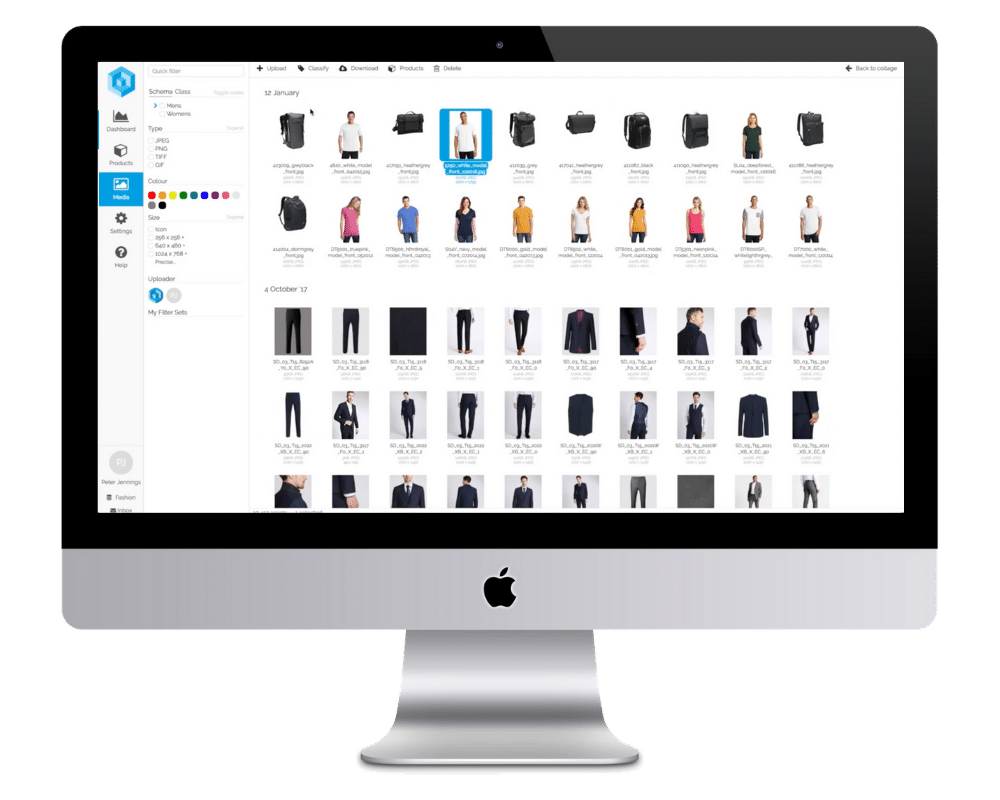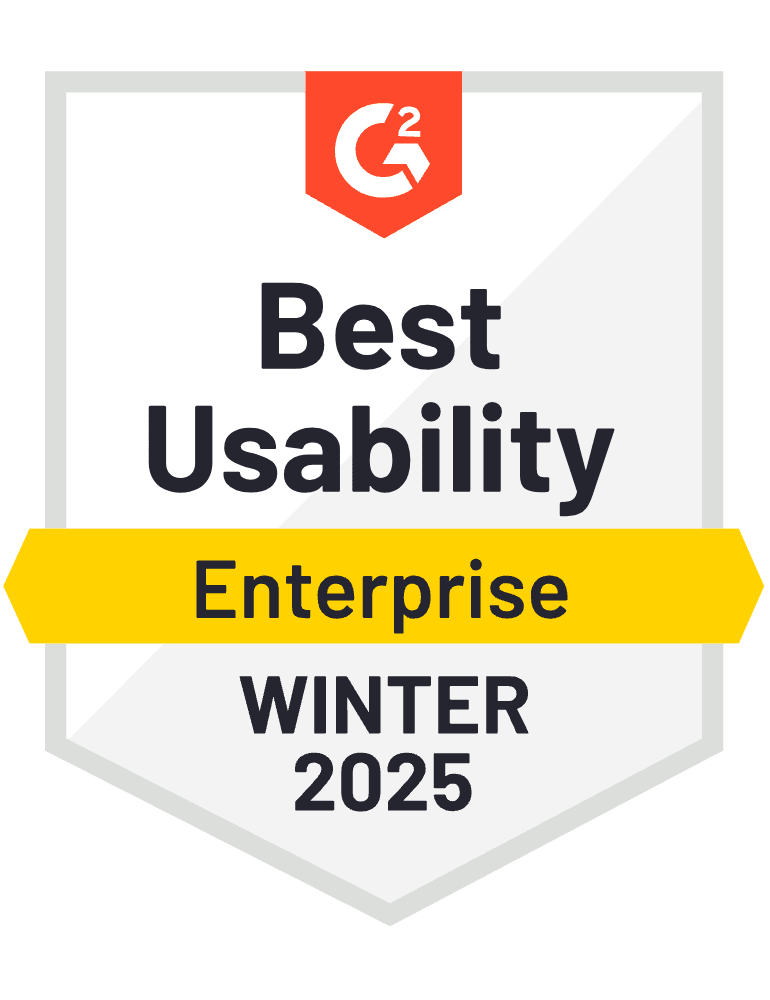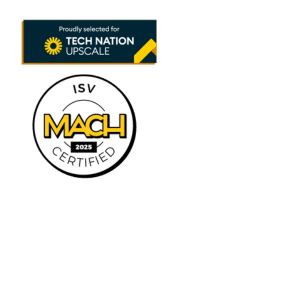Key Features to Consider in Enterprise eCommerce Platforms
To choose the best eCommerce solutions in 2025, enterprise businesses must evaluate a platform’s core functionalities that support growth and long-term success. These customizable eCommerce solutions must not only meet current needs but also adapt to future demands. Below are four essential features that every enterprise eCommerce platform must have—each critical to building a secure, scalable, and seamless digital commerce operation.
Scalability and Performance
Enterprise businesses experience high volumes of traffic, transactions, and product data. A scalable eCommerce platform allows your business operations to remain seamless during peak demand, seasonal spikes and new product launches. Without robust performance capabilities, you risk downtime and lost revenue. Look for platforms with high uptime guarantees, rapid load times, and the ability to grow with your business.

Customization and Multi-Store Management
Every enterprise has a unique workflow, branding, and customer experiences. Customizable eCommerce solutions let you tailor everything from storefront design to backend operations.
Multi Store management and omnichannel sales support are vital, enabling your brand to manage various storefronts, regions, and customer segments from a single dashboard.
Third-Party App & API Integration Capabilities
Successful digital ecosystems rely on seamless ERP integration and connectivity with CRMs, marketing automation tools, and inventory management systems, such as a PIM and/or DAM.
Advanced Security and Compliance Features
With growing concerns around data privacy and cyber threats, secure online transactions are non-negotiable. Enterprise eCommerce platforms must offer built-in PCI DSS compliance, SSL encryption, and role-based access controls.
Whether opting for a SaaS or self-hosted model, your eCommerce platform must prioritize data protection while freeing up internal resources to focus on strategic growth initiatives.
Top Enterprise eCommerce Platforms Compared

Salesforce Commerce Cloud
A Software as a service (SaaS) choice for companies wishing to optimize their omnichannel retail is Salesforce Commerce Cloud. Customers can use this platform to manage their sales and digital channels with a single, consolidated solution. Salesforce Commerce Cloud is a scalable system best suited for various customer markets and works well for B2C, B2B, and B2B2C enterprises.
Despite the company’s efforts to portray itself as a single platform, many of its products like Salesforce Commerce Cloud B2C are purchased software that was developed outside of the Salesforce ecosystem and are still sold separately today. Because of this, Salesforce’s feature development including the pros and cons has prioritized brand acquisitions over innovation in core commerce.
Salesforce strives to be an all-in-one solution, much like Shopify. Nevertheless, this drive to remain in the Salesforce ecosystem may result in restrictions for business brands looking to achieve their eCommerce objectives.
In addition, the total cost of ownership of Salesforce Commerce Cloud is higher than that of alternative platforms, such as BigCommerce. Merchants may find it challenging to enhance and optimize their websites without first paying a substantial amount due to high development expenses, pricing structure, limited integrations, and costly licensing fees.

SAP Commerce Cloud
SAP Hybris Commerce, an on-premise hosting solution, was the company’s first eCommerce product. Additionally, SAP Hybris Commerce developed into its cloud-based eCommerce solution, SAP Commerce Cloud, over time.
Businesses having a significant global presence will find SAP Commerce Cloud’s inherent features, such as multi-site, multi-language, and multi-currency support, appealing and best suited for their company. The platform offers numerous pros and cons, including omnichannel capabilities, support for multiple product catalogs, subscription order management, and advanced data management tools. However, despite its extensive range of sophisticated features, businesses hosting their websites on this platform may encounter certain challenges.
In addition, the website is renowned for having several features that seem antiquated in comparison to other platforms. The TCO of the program is another possible obstacle. A lot of notable customers think the platform is pretty pricey. The platform’s TCO may increase due to the tool’s cost and the cost of paying developers to create and manage the website, rendering it an unsuitable option.
Oracle Commerce Cloud
Professionals refer to the cloud-hosted solution spin-off from Oracle Commerce on-premises as ‘Oracle CX Commerce,’ formerly known as Oracle Commerce Cloud. It uses a single SaaS platform that works best for both B2B and B2C clients across many verticals.
Oracle designed the architecture of Oracle CX Commerce with an API-first approach, which allows for development flexibility. It is a platform whose key features and capabilities work to assist enterprise firms in scaling, and it also supports multi-channel strategies and contains AI characteristics.
However, before selecting Oracle CX Commerce as your eCommerce solution, you need to take a few pros and cons into account. It has a steep learning curve, just like SAP Commerce Cloud. It can take a lot of time to get used to the tool, which some organizations might not have, particularly if they have a tight launch date. Hiring a development team is one way to solve this, but be aware that this might drastically increase your TCO.
The platform encourages notable customers to combine technologies with the Oracle ecosystem. This may restrict brands who want to integrate external technology into their website. If you choose to use Oracle’s suite of tools, be aware that doing so may make it more difficult and expensive to re-platform to a different tool in the future.
BigCommerce Enterprise
Based on an Open SaaS paradigm, the platform’s key features and capabilities give users the flexibility of open-source software along with all the advantages of a SaaS platform, enabling them to design the online store of their dreams. Brands may create the tech stack of their dreams with this architecture. BigCommerce provides a large array of native tools as well as third-party applications that enable companies to build a strong website entirely within the platform. With their headless build, brands capitalize on the software’s ability to integrate best-in-class technology and modifications that work to position their website for success.
Notable customers may better support the B2B market segment, run many stores from a single back-end, and allow clients to pick up online orders at their desired location with these various functions. The platform’s collaboration with Feedonomics also enables users to develop a strong omnichannel strategy. Apart from its pros and cons, customers like BigCommerce for its superior security, exceptional customer support, and reduced Total Cost of Ownership (TCO).

Industry-Specific eCommerce Platform Recommendations
Fashion & Apparel
- Visual customization
- Rapid product updates
Manufacturing
- Robust B2B features
- Complex product configurations
Distribution
- Bulk ordering
- Inventory management
Homewares
- Strong content management
- Visual merchandising
Food & Beverage
- Subscription models
- Inventory and expiry tracking
Multi-Brand Retailers
- Centralized catalog management
- Multi-store and channel integrations
IT/Tech
- Advanced technical integrations
- High scalability
Integration Capabilities with Enterprise Systems
eCommerce success depends on the ability to synchronize systems and data across every touchpoint. That’s why seamless integration with core enterprise systems—like ERP, CRM, PIM, and DAM—is no longer optional. It’s essential for operational efficiency, data consistency, and a unified customer experience.
ERP integration ensures your product data reflects real-time inventory, pricing, and supply chain updates, minimizing manual errors and delays. At the same time, CRM connectivity enables personalized marketing and customer service by aligning product content with buyer history and preferences. By integrating with enterprise PIM systems, businesses can enrich and syndicate accurate, compelling product data across every channel. Add to that the power of Digital Asset Management (DAM), and you unlock a fully orchestrated content ecosystem.

This level of connectivity doesn’t just streamline internal processes—it’s the backbone of unified commerce. Businesses using Pimberly, for example, have seen measurable results by breaking down silos between systems. In turn, they’re achieving a single source of truth for their product content. You can explore some of these real-world results on our Customer Success Stories page.
To understand the broader value of integration, check out the full business benefits of PIM and DAM and how they fit into a future-proof digital strategy. New to PIM? Our PIM 101 guide is a great place to start.
Total Cost of Ownership (TCO) and ROI Considerations
When evaluating enterprise eCommerce solutions, it’s easy to focus on upfront licensing fees—but total cost of ownership (TCO) goes far beyond that. To make smart long-term investments, businesses need to assess the full picture: implementation and development costs, ongoing maintenance, scalability, and the internal resources needed to manage it all.
An effective long-term eCommerce strategy should account for how easily the solution integrates with your existing tech stack, how much custom development is required, and whether the platform can grow with your business without incurring hidden costs. Solutions that offer pre-built connectors to PIM, DAM, and ERP platforms can significantly reduce time-to-value while minimizing integration spend.
Understanding TCO is only half the equation—businesses must also calculate the eCommerce investment ROI. This means analyzing how improvements to product data quality, time-to-market, and omnichannel consistency contribute to measurable outcomes like higher conversion rates, fewer returns, and increased operational efficiency. With a cost-effective eCommerce solution like Pimberly, customers have achieved remarkable ROI by streamlining workflows and scaling product content creation without increasing headcount. You can explore these success stories here.
2025 Trends Shaping Enterprise eCommerce Platforms
The enterprise eCommerce platform landscape is evolving rapidly, and staying ahead of emerging trends is critical for businesses aiming to deliver top-tier digital experiences. As technological innovation accelerates and consumer expectations become more nuanced, the best eCommerce solutions 2025 will be those that seamlessly integrate cutting-edge capabilities while remaining scalable, customizable, and industry-specific. Below are the key developments defining the future of scalable eCommerce platforms in 2025.
AI and Machine Learning Integration
AI is no longer a future consideration—it’s a present-day necessity. In 2025, enterprise eCommerce platforms are leveraging AI to deliver hyper-personalized customer journeys through intelligent product recommendations, automated content creation, and dynamic pricing strategies. Tools like ChatGPT, Copilot, and Google’s Gemini are streamlining customer support and accelerating content production, making customizable eCommerce solutions more powerful and intuitive than ever.
Headless eCommerce Adoption
Adopting a headless architecture is becoming standard among enterprises that value flexibility and rapid innovation. By decoupling the frontend from the backend, headless enterprise eCommerce platforms allow businesses to experiment across digital channels without disrupting core functionality. This architecture is especially beneficial for industries like fashion, tech, and food & beverage that require frequent UX updates and omnichannel agility.

Case Study:
Yeti Cycles was unable to swiftly bring its items to market due to its complex tech stack. They found, with the assistance of an agency partner, that they could match the exact engineering of their goods with a headless eCommerce solution. They found that going headless gave them the boost they needed to innovate and expand. Instead of requiring a significant amount of time and development resources, it created a completely new source of income. Headless eCommerce is a crucial aspect of enterprise eCommerce platforms and a trend that just can’t be overlooked in 2025.
Mobile-First, Voice Commerce and Social Commerce
With mobile traffic accounting for over 55% of global internet usage, optimizing for mobile is no longer optional it’s foundational. In 2025, platforms must support mobile-first design, voice commerce, and social commerce integrations to meet users where they are. Enterprises are also utilizing in-app purchases, livestream selling, and voice-activated search to increase accessibility and drive conversions on the go.

Sustainability Features
Sustainability is now a deciding factor in vendor selection. Millennials and Gen Z consumers are increasingly prioritizing brands that align with their values, including eco-consciousness and social responsibility. The best eCommerce solutions 2025 offer built-in sustainability features like carbon tracking, ethical sourcing transparency, and eco-friendly packaging options—giving enterprises a competitive edge while aligning with customer expectations.
Emerging Technologies & Economic Pressures
As economic uncertainty looms, with high interest rates, tighter consumer budgets, and increased debt, enterprises must lean into emerging technologies to drive efficiency and retention. Investments in AR/VR, predictive analytics, and real-time personalization are helping brands offer standout experiences despite market volatility. The enterprise platforms that support these capabilities will be best positioned to grow in 2025’s competitive environment.
Implementation & Migration of an Enterprise eCommerce Platform
Switching to a new enterprise eCommerce platform in 2025 remains a complex but transformative undertaking. With careful planning and the right strategy, businesses can streamline operations, unlock scalability, and future-proof their digital commerce stack. Below are critical considerations to ensure a smooth migration experience.
Initiate a Detailed Planning Process
Once you’ve selected your eCommerce platform, you must create a comprehensive migration plan. Define the project scope, assign roles, and outline key deliverables. A successful migration depends on meticulous planning—create detailed timelines, risk assessments, and contingencies to keep your team aligned and informed.
Set Realistic Timeline Expectations
Set up realistic timeline expectations considering the data migration, data analyses, training of staff, and optimization of duties, roles, and responsibilities. Having a clear and realistic timeline expectation will help your departments work collectively towards the implementation and migration of the enterprise eCommerce platform, rather than expecting unrealistic outcomes.
Be Prepared for Common Challenges
It’s critical to thoroughly evaluate the new platform after data migration. To guarantee seamless operation, test each feature while attempting to replicate as closely as feasible the real-world user experience. Address any problems that arise throughout the testing procedure. Keep a tight eye on the platform for a few weeks after launch to identify any unforeseen issues. Pay close attention to KPIs related to sales, user experience, and performance.
Check out our quick and to-the-point 1-minute video to see just how a PIM plays a role in seamless eCommerce to get ahead of the competition.
Don’t Overlook Resource Requirements
Conclusion and Next Steps
A successful transition means carefully migrating all essential data—from SKUs and digital assets to customer records and historical orders. Ensure legacy content like product descriptions, spec sheets, and blog posts are not lost or degraded in the move. Tools like Pimberly’s PIM and DAM functionalities are ideal for maintaining data integrity and operational continuity during migration.

choosing the right eCommerce solutions means balancing robust functionality with integration capabilities, long-term value, and measurable ROI. Whether you’re evaluating PIM systems, exploring cost-effective eCommerce solutions, or aiming to unify your tech stack across ERP, CRM, and DAM platforms, the stakes are high—and so are the rewards.
The key takeaway? A future-proof digital commerce strategy starts with centralized, scalable, and integrated systems. Businesses that invest wisely in these foundations position themselves for long-term success, improved operational efficiency, and a better customer experience. As seen in our customer stories, the right platform can drive real transformation across your organization.
Ready to explore how Pimberly can support your digital goals? Start by reviewing the business benefits of a modern PIM and DAM solution—or dive into the PIM 101 guide if you’re just beginning your journey.
Frequently Asked Questions About Choosing the Right eCommerce Platform
1) What is the best eCommerce platform for small businesses?
- Look for platforms that are affordable, easy to set up, and offer good customer support.
- Examples include solutions with drag-and-drop builders, limited upfront costs, and essential marketing tools.
2) What is the best eCommerce platform for startups?
- Choose platforms that allow fast product launches and offer flexibility as you scale.
- Features to look for include low-code customization, modular growth, and integration with funding/payment tools.
3) Which eCommerce platform offers the best support?
- Ideal platforms provide 24/7 live chat, onboarding help, and robust knowledge bases.
- Check for user reviews and availability of premium support options.
4) Which eCommerce platform is best for B2B businesses?
- Platforms should support features like bulk pricing, quote requests, and custom catalogs.
- Integration with ERP and CRM tools is a must for streamlined operations.
5) Which eCommerce platform is best for dropshipping?
- Choose platforms that connect easily with dropshipping apps and automate inventory syncing.
- Look for order routing automation and supplier integration tools.
6) Which eCommerce platform offers the best integration with social media?
- Top platforms enable Facebook Shops, Instagram product tagging, TikTok store connections, and ad syncing.
- Prioritize native integrations and analytics for social traffic performance.
7) Which eCommerce platform offers the best marketing tools?
- Look for SEO optimization, email marketing, cart abandonment recovery, and loyalty programs.
- Platforms with integrated A/B testing and campaign dashboards are a plus.
8) Which eCommerce platform offers the best integration with third-party apps?
- The best options have expansive app ecosystems or marketplaces (like Shopify or BigCommerce).
- Ensure APIs and no-code connectors are available for faster deployment.
Take a deeper dive
In a personalized demo of our product information management (PIM) platform, you’ll see how you can:
- Easily create, enrich and automate complex product data, images, and videos.
- Drive sales and deliver best-in-class online experiences.
- Increase revenue by reaching new channels and markets with confidence in your data.
- Give your teams a central hub to manage and update product data.
Book a Demo













